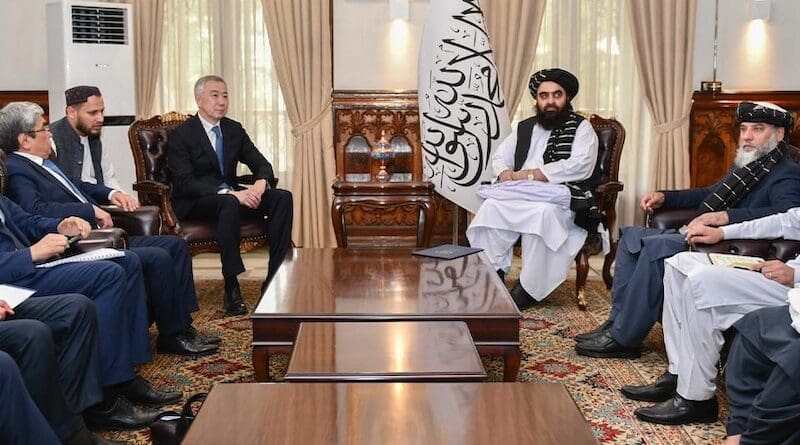Kazakhstan Removes Taliban From List Of Banned Organizations
By Eurasianet
By Almaz Kumenov
(Eurasianet) — Kazakhstan has removed the Taliban, the militant Islamic movement that seized power in Afghanistan in 2021, from its register of prohibited organizations in a move that the Foreign Ministry on December 29 described as being in compliance with UN guidance.
“The decision to remove the Taliban from our list of prohibited organizations is in strict accordance with the resolutions laid down by the UN Security Council,” Aybek Smadiyarov, a ministry spokesperson, was quoted as saying by the Kazinform state news agency.
Smadiyarov clarified that this was an allusion to the fact that the Taliban has not been classified as a terrorist organization by UN Security Council.
Kazakhstan’s Supreme Court, however, labeled the Taliban a terrorist organization in 2005, along with several other groups such as Al-Qaeda, the East Turkestan Islamic Movement, the Islamic Movement of Uzbekistan, and the Kurdish People’s Congress.
In spite of that designation, Astana has been quietly cultivating ties with the self-styled Islamic Emirate in Afghanistan ever since the Taliban took over following the withdrawal of U.S. forces in August 2021. Bilateral engagements saw a significant upsurge in the shape a Kazakhstan-Afghanistan business forum held in April. That format later produced commercial agreements amounting to around $200 million.
Annual trade between Kazakhstan and Afghanistan has risen close to $1 billion since the Taliban’s ascension. Kazakh agriculture producers have found this a particularly promising avenue, given the pressure they have faced amid intense competition from their Russian peers.
The decision to go back on the Taliban proscription is somewhat unexpected, though.
In July, Deputy Foreign Minister Kanat Tumysh went on the record to state that the option of removing the organization from its banned registry was not on the agenda. He noted at the same time that the Taliban is not formally deemed a proscribed organization by the United States and other major Western nations. This stance was put forward as a defense for Kazakhstan’s official engagement with the group.
As Dosym Satpayev, head of the Risk Assessment Group, a think tank, has argued that this ambiguity was designed to enable the United States to sustain some form of diplomatic dialogue with the Taliban, which has been ongoing since 2018 in Qatar.
For Kazakhstan to continue engaging with Afghanistan, excluding Taliban from a list of undesirable organizations was imperative, he wrote in an article for the Forbes.kz website.
Almaz Kumenov is an Almaty-based journalist.

